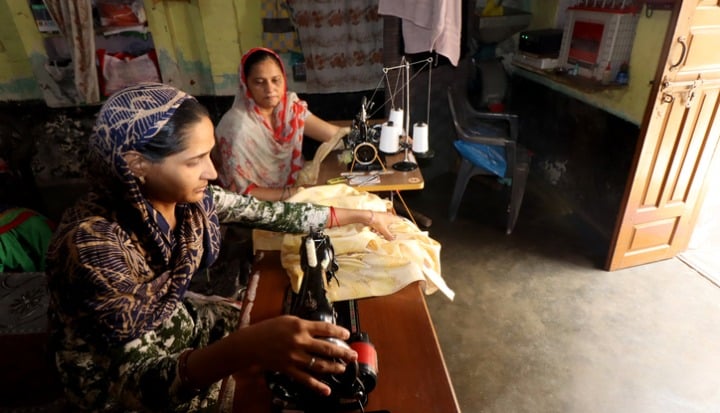Before COVID-19, over 700 million people worldwide were living in extreme poverty. The pandemic could push an additional 150 million people into extreme poverty by the end of 2021. People experiencing extreme poverty already have limited access to health care, food, clean water, and public services. They face obstacles in accessing markets, employment opportunities, and financial services, and this inequality has only increased due to pandemic lockdowns.
As market closures and disrupted supply chains worsen economic exclusion and amplify the existing vulnerabilities of people in extreme poverty, hundreds of millions of people need support to access and integrate into markets. In this moment, social businesses can go beyond corporate philanthropy or small-scale CSR initiatives and support transformative change by working economic inclusion for people in extreme poverty into the foundation of their business models. By thinking through how to ethically include vulnerable groups in their supply chains, products, and service offerings, businesses can do what is morally right while supporting inclusive and equitable economic growth.
At BRAC Ultra-Poor Graduation Initiative, our experience partnering with local businesses on anti-poverty programs in Africa and South Asia has taught us that the private sector can go beyond supporting poverty alleviation financially. BRAC is a social business at heart, and one which understands that giving people the tools and support they need to build self-sustaining livelihoods empowers them to lift themselves and their families out of poverty long term. We have seen this approach work, and we want private sector partners to join our efforts.
Through the provision of livelihood assets, cash transfers, savings support and continued mentoring and training, BRAC’s Graduation approach addresses participants’ multidimensional needs within the local context and helps the world’s poorest people transition to greater self-sufficiency, autonomy, and dignity. In Bangladesh, BRAC’s flagship Graduation program has helped over 2.1 million Bangladeshi households escape extreme poverty long term. Our mission is to scale Graduation through government partnerships to reach an additional 21 million people by 2026.
At the country level, local business partners have supported Graduation participants’ economic inclusion by linking them to jobs, training, financial services, and local value chains. In a recent Graduation pilot in the Philippines with the Department of Labor and Employment (DOLE) and the Asian Development Bank, we developed partnership agreements with local vendors to acquire the productive assets, training, and support our participants needed to start their livestock-based livelihoods like poultry and swine fattening. They trained participants, provided additional vitamins and medicines for livestock, and offered veterinary services they could reach out to. Connecting participants to reputable service providers helped them access to the tools they needed to better their lives.
We have also seen how improving financial inclusion by facilitating Graduation participants’ connections to mobile banking has helped build resilience during COVID-19. In Bangladesh, BRAC’s own social enterprise, BRAC Bank, worked with our flagship Ultra-Poor Graduation (UPG) program to adapt to the needs of participants during the pandemic. Using its mobile money platform bKash, BRAC was able to pilot and scale digital cash transfers to help meet the urgent needs of over 50,000 participants quickly and safely. Last May, bKash and other private digital financial service providers facilitated direct digital government-to-person (G2P) payments on a national scale to reach five million families with cash aid.
Our local experiences show that businesses can make economic inclusion for people in poverty an integral part of their supply chains, products, and service offerings. Social businesses that want to help marginalized people escape the poverty trap need to start from the position of “do no harm” and eliminate the exploitation of the poorest people as cheap labor or consumers of low quality goods from their business models. Beyond that, there are examples of large businesses successfully improving market access for people in extreme poverty.
Social innovations by international businesses can support both people and planet by making their supply chains more inclusive, working with local businesses that guarantee purchasing or distribution to informal workers and microenterprises. Yunus Social Business, for instance, is working with a German company to develop a social business in plastics recycling. Yunus and their partner are setting up sourcing relationships with social entrepreneurs in India to hire informal workers reselling plastic waste who previously made under $2 USD a day, empowering them to escape extreme poverty while increasing the amount of recycled plastics in the company’s supply chain.
Financial service providers can also join governments and multilateral institutions to support financial inclusion for people in poverty. For example, BRAC Bank has partnered with the Government of Bangladesh and UNDP to pilot ways to make the national social security system more inclusive. Using bKash and other mobile money providers, the program strengthened government capacity to transfer cash directly to social security recipients and understand their levels of financial inclusion.
There is an opportunity for businesses to support economic and financial inclusion for the world’s poorest people. We have seen at the local level that private sector partners can provide the training and supplies Graduation participants need to build sustainable, resilient livelihoods. There is much more room to explore how the private sector can support economic and financial inclusion, whether through sourcing, distribution, financial services, or other means.
It is time to talk about how businesses can make poverty alleviation core to the way they operate. How can we collaborate to build a more just, inclusive economy?










